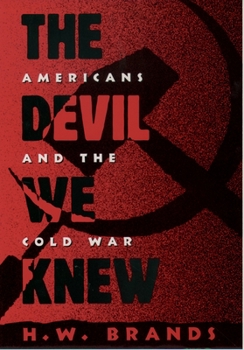The Devil We Knew: Americans and the Cold War
Select Format
Select Condition 
Book Overview
In the late 1950s, Washington was driven by its fear of communist subversion: it saw the hand of Kremlin behind developments at home and across the globe. The FBI was obsessed with the threat posed by American communist party--yet party membership had sunk so low, writes H.W. Brands, that it could have fit "inside a high-school gymnasium," and it was so heavily infiltrated that J. Edgar Hoover actually contemplated using his informers as a voting...
Format:Paperback
Language:English
ISBN:0195093771
ISBN13:9780195093773
Release Date:October 1994
Publisher:Oxford University Press, USA
Length:256 Pages
Weight:0.75 lbs.
Dimensions:0.6" x 5.5" x 8.5"
Customer Reviews
1 rating
The Cold War: Ideology or Simply Competing Interests?
Published by Thriftbooks.com User , 23 years ago
On the final page of this brief, but provocative, rumination about the United States' Cold War experience, author H.W. Brands, professor of history at Texas A & M University, presents this paradox: In 1945, nearly all Americans and probably a majority of interested foreigners had looked on the United States as a beacon shining the way to a better future for humanity, one in which ideals mattered more than tanks. During the next forty years,American leaders succeeded in convincing many Americans and all but a few foreigners that the United States could be counted on to act pretty much as great powers always have. To the extent that Brands is correct, the question, of course, is: Why? This is not merely an intellectual exercise. During the Cold War, Brands reminds us: "More than 100,000 Americans died fighting wars that had almost nothing to do with genuine American security." Practically all of them died in the barren hills of Korea and the steaming jungles of Vietnam. The question, again, is: Why?Brands posits the "dual character of the Cold War - being both a geopolitical and an ideological contest" and explains: "The ideological gulf between the United States and the Soviet Union gave the geopolitical rivalry unprecedented urgency." In Brands's interpretation, the origins of the Cold War were partly the dynamics of conventional international relations: The United States and the Soviet Union emerged from the Second World War as the only world powers, so, practically by definition, they had to be rivals. But, as Brands, observes, geopolitical competition was intensified by extreme ideological differences. According to Brands: "By the middle 1950s, the American alliance system girdled the globe" and "[a]bout the only thing all the countries in the American system shared was an avowed opposition to communism." Sometimes this proved awkward. Brands reminds us that "Washington could be counted on to praise allies and clients for their opposition to godless communism, if not for their strict observance of the human rights and civil liberties of all their subjects." According to Brands, "by allying with repressive regimes, the American government undercut the popular moral base on which America's containment policy rested." The United States' alliances with unsavory right-wing dictators were prompted by the imperative for national survival. According to Brands, "[f]or the first time in American history, an enemy [possessed] the capacity to strike quickly and devastatingly at America's industrial resources and population." And Brands writes that after Sputnik's launch: "For the first time in their history, Americans found themselves facing the specter of national extinction." But "the anti-communist crusade...[also] served purposes that had little to do with its professed fear for American security." In 1963, for instance, during hearings on what became the Civil Rights Act of 1964, Sen. Str






